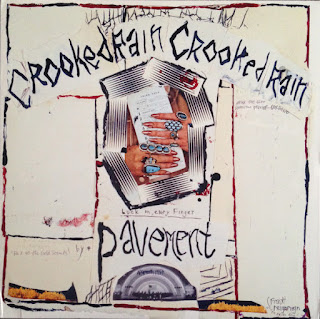Jessica Bailiff - Jessica Bailiff (Album Review)
Jessica Bailiff - Jessica Bailiff
(2002)
My copy: 2002 press by Kranky.
Jessica Bailiff got her start in the mid 90s performing with various bands in Toledo before splitting to focus entirely on a solo project. Aided by her friend Alan Sparhawk of Low, she committed to the Kranky label releasing her debut in ‘98. Four years later, her self-titled third full-length would continue to improve on Bailiff’s ability to craft slow, dark and surreal worlds of her own - though at times via wafer-thin structures that fail to leave a deep impression.
“Swallowed” has unfurling piano and acoustic strumming over a softly pounding rhythm section. Bailiff’s vocals are ghostly and smooth, contrasting the metallic horror strings that accent the chord changes. The strings are strangely sweet when the chords are major, despite their sharp, rusted sound. The fear factor is dialed up on “Hour Of The Traces” as the strings whine with an industrial tone, not unlike the soundtrack to The Texas Chainsaw Massacre. The percussion is dampened and syncopated against deep, booming bass drum hits as everything slowly and steadily marches along. The slow, soft singing is the only thing keeping the track from pure horror movie territory, along with some quiet woodwinds near the end.
“The Hiding Place” is a slow folk ballad with tinges of psych influence in Bailiff’s delayed and layered vocals. There also appears to be a sitar performance or some other eastern string instrument though any coherent melodies are generally softened intentionally to keep with the darker atmosphere. Panning, shimmering strings dimly light up “Big Hill” as bass notes murmur carefully beneath. The slightly distorted arpeggios of “You Were So Close” keep to a tense progression alongside burning background noise until the chords open up into a brighter movement. These songs are not quite slowcore and not quite ambient, sometimes leaving them limping in a strange middle realm - “Disappear” has impressive droning siren sounds but feels afraid to commit to one theme.
The layering of sound effects on “Mary” is engaging as the vocals pan from left to right before a cascade of feedback sweeps over the piece. “Time Is An Echo” makes interesting use of reverse effects, though its middle passage lingers too long given that the later reversed version of its main piano motif sounds far more immersive than the unaffected version. “The Thief” is simple, tender closer with guitar, piano and a focus on lush vocal harmonies.
Bailiff’s efforts here are notably spectral, and even downright eerie on occasion. It’s merely the structural simplicity that results in loss of attention given that the album sits uncomfortably between Grouper’s purely meditative ambiance and Lisa Germano’s experimental dark ballad. Still, Jessica Bailiff is not a record to fully dismiss, as its calculated gloom is the perfect soundtrack for a chilly autumn evening.




Comments
Post a Comment